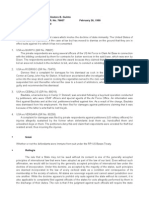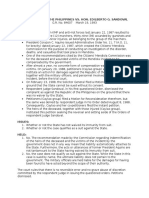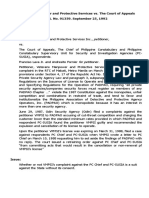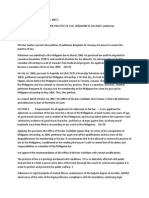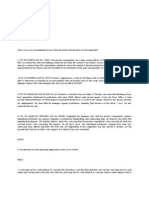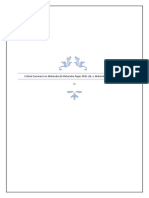Us VS Guinto
Us VS Guinto
Uploaded by
Lito Paolo Martin IICopyright:
Available Formats
Us VS Guinto
Us VS Guinto
Uploaded by
Lito Paolo Martin IIOriginal Description:
Original Title
Copyright
Available Formats
Share this document
Did you find this document useful?
Is this content inappropriate?
Copyright:
Available Formats
Us VS Guinto
Us VS Guinto
Uploaded by
Lito Paolo Martin IICopyright:
Available Formats
US VS GUINTO (February 26, 1990) These cases have been consolidated because they all involve the doctrine
of state immunity. The United States of America was not impleaded in the complaints below but has moved to dismiss on the ground that they are in effect suits against it to which it has not consented. It is now contesting the denial of its motions by the respondent judges. MAIN ISSUE: Is the doctrine of state immunity applicable in the cases at bar? 1. US VS GUINTO (GR No. 76607) Facts: The private respondents are suing several officers of the US Air Force in Clark Air Base in connection with the bidding conducted by them for contracts for barber services in the said base which was won by a certain Dizon. The respondents wanted to cancel the award to the bid winner because they claimed that Dizon had included in his bid an area not included in the invitation to bid, and subsequently, to conduct a rebidding. Held: The court finds the barbershops subject to the concessions granted by the US government to be commercial enterprises operated by private persons. The petitioners cannot plead any immunity from the complaint, the contract in question being decidedly commercial . Thus, the petition is DISMISSED and the lower court directed to proceed with the hearing of the case.
2. US VS RODRIGO (GR No 79470) Facts: Genove, employed as a cook in the Main Club at John Hay Station, was dismissed after it had been ascertained in an investigation that he poured urine in the soup stock. Genove filed a complaint for damages against the club manager who was also an officer of USAF. Held: The restaurant services offered at the John Hay Station operated for profit as a commercial and not a government activity. The petitioners cannot invoke the doctrine of self immunity to justify the dismissal of the damage suit filed by Genove. Not even the US government can claim such immunity because by entering into the employment contract with Genove in the discharge of its proprietary functions, it impliedly divested itself of its sovereign immunity from suit. Still, the court holds that the complaint against petitioners in the lower court be dismissed. There was nothing arbitrary about the proceedings in the dismissal of Genove. The petitioner acted quite properly in terminating the private respondents employment for his unbelievably nauseating act of polluting the soup stock with urine.
3. US VS CEBALLOS (GR No 80018) Facts: Luis Bautista, a barracks boy in Camp ODonnel, was arrested following a buy-bust operation conducted by petitioners who were USAF officers and special agents of the Air Force Office. A trial ensued where petitioners testified against respondent Bautista for violation of the Dangerous Drugs Act. As a result of the charge, Bautista was dismissed from his employment. He then filed for damages against petitioners claiming that because of the latters acts, he was removed from his job.
Held: It was clear that the individually named petitioners were acting in the exercise of their official functions when they conducted the buy-bust operation and thereafter testified against the complainant. For discharging their duties as agents of the United States, they cannot be directly impleaded for acts imputable to their principal, which has not given its consent to be sued. The conclusion of the trial court that the answer filed by the special counsel of Clark Air Base was a submission of the US government to its jurisdiction is rejected. Express waiver cannot be made by a mere counsel of the government but must be effected through a dulyenacted statute. Neither does it come under the implied form of consent. Thus, the petition is granted and the civil case filed in the lower court dismissed. 4. US VS ALARCON VERGARA (GR No 80258) Facts: Complaint for damages was filed by private respondents against individual petitioners for injuries allegedly sustained by handcuffing and unleashing dogs on them by the latter. The individual petitioners, US military officers, deny this stressing that the private respondents were arrested for theft but resisted arrest, thus incurring the injuries. In all these cases, the individual petitioners claimed they were just exercising their official functions. The USA was not impleaded in the complaints but has moved to dismiss on the ground that they are in effect suits against it to which it has not consented. Held: The contradictory factual allegations in this case need a closer study of what actually happened. The record were too meager to indicate that the defendants were really discharging their official duties or had actually exceeded their authority when the incident occurred. Only after the lower court shall have determined in what capacity the petitioners were acting will the court determine, if still necessary, if the doctrine of state immunity is applicable. Accordingly, the case is remanded to the lower court for further proceedings. MAIN DOCTRINE: A state may not be sued without its consent. This doctrine is not absolute and does not say the state may not be sued under any circumstance. The rule says that the state may not be sued without its consent, which clearly imports that it may be sued if it consents. The consent of the state to be sued may be manifested expressly or impliedly. Express consent may be embodied in a general law or a special law. Consent is implied when the state enters into a contract or it itself commences litigation. When the government enters into a contract, it is deemed to have descended to the level of the other contracting party and divested itself of its sovereign immunity from suit with its implied consent. Waiver is also implied when the government files a complaint, thus opening itself to a counterclaim. The USA, like any other state, will be deemed to have impliedly waived its non-suability if it has entered into a contract in its proprietary or private capacity.
You might also like
- USA V Guinto (Case Digest)Document2 pagesUSA V Guinto (Case Digest)haruhime08100% (9)
- Con Law Full OutlineDocument40 pagesCon Law Full OutlineKaitlyn MakerNo ratings yet
- Ople V TorresDocument3 pagesOple V TorresshelNo ratings yet
- Pleadings & MotionsDocument6 pagesPleadings & MotionsstrgrlNo ratings yet
- PNOC Vs CADocument2 pagesPNOC Vs CAPaula Jane EscasinasNo ratings yet
- Minucher VsDocument4 pagesMinucher VsZoe Jen RodriguezNo ratings yet
- Tanada Vs Angara DigestedDocument1 pageTanada Vs Angara DigestedRobert Kane ReyesNo ratings yet
- 20.republic vs. Feliciano, 148 SCRA 424Document7 pages20.republic vs. Feliciano, 148 SCRA 424JTupak100% (3)
- Republic Vs SandovalDocument2 pagesRepublic Vs SandovalivyNo ratings yet
- Case DigestDocument3 pagesCase DigestAlbert AgnesNo ratings yet
- Knowledge Is Power, But Only Wisdom Is LibertyDocument1 pageKnowledge Is Power, But Only Wisdom Is LibertyNap GonzalesNo ratings yet
- Bureau of Printing Vs Bureau of Printing Employees AssociationDocument2 pagesBureau of Printing Vs Bureau of Printing Employees AssociationHannesNo ratings yet
- Republic of The Philippines Vs Roque GR 203610 2016Document13 pagesRepublic of The Philippines Vs Roque GR 203610 2016Lu CasNo ratings yet
- Case Digests (SuabilityDocument23 pagesCase Digests (SuabilityAngelineNo ratings yet
- Republic Vs VillasorDocument1 pageRepublic Vs VillasorBeverly Jane H. Bulanday50% (2)
- Digest 19 - Republic of Indonesia S. Vinzon, June 26, 2003Document2 pagesDigest 19 - Republic of Indonesia S. Vinzon, June 26, 2003CattleyaNo ratings yet
- Veterans vs. The Court of AppealsDocument2 pagesVeterans vs. The Court of AppealsMary Louise BalbuenaNo ratings yet
- Chavez Vs Romulo GR 157036 09 June 2004Document1 pageChavez Vs Romulo GR 157036 09 June 2004Alder AbadinasNo ratings yet
- Dolalas Vs OmbudsmanDocument4 pagesDolalas Vs OmbudsmanAnne Margaret Espiritu MomonganNo ratings yet
- Ministerio Vs City of CebuDocument1 pageMinisterio Vs City of CebuRV LouisNo ratings yet
- US Vs RUIZ DigestDocument1 pageUS Vs RUIZ DigestRay Lambert MenchavezNo ratings yet
- In Re Benjamin DacanayDocument4 pagesIn Re Benjamin Dacanayjeesup9No ratings yet
- Digest Fernando Festejo Festejo v. Fernando Festejo Vs FernandoDocument2 pagesDigest Fernando Festejo Festejo v. Fernando Festejo Vs FernandoDexter LedesmaNo ratings yet
- Manalo v. Sistoza, G.R. 107369, August 11, 1999Document8 pagesManalo v. Sistoza, G.R. 107369, August 11, 1999Reginald Dwight Florido100% (1)
- 136 Scra 487 - Us Vs RuizDocument7 pages136 Scra 487 - Us Vs RuizMj Garcia100% (1)
- IBP vs. ZAmora DigestDocument2 pagesIBP vs. ZAmora DigestKim Diaz100% (1)
- Criminal Procedure 2017Document184 pagesCriminal Procedure 2017daryllNo ratings yet
- Potenciano R. Malvar vs. Atty. Freddie B. FeirDocument5 pagesPotenciano R. Malvar vs. Atty. Freddie B. FeirErole John AtienzaNo ratings yet
- 5-20 USA Vs Guinto, G.R. No. 76609 February 26 1990Document13 pages5-20 USA Vs Guinto, G.R. No. 76609 February 26 1990Reginald Dwight FloridoNo ratings yet
- Astorga Vs VillegasDocument2 pagesAstorga Vs VillegasRR F100% (1)
- PEOPLE OF THE PHILIPPINES vs. MAXIMO DELA PEÑA ET. ALDocument1 pagePEOPLE OF THE PHILIPPINES vs. MAXIMO DELA PEÑA ET. ALanna100% (2)
- Angara Vs Electoral CommissionDocument1 pageAngara Vs Electoral Commissiongherold benitezNo ratings yet
- Alba V EvangelistaDocument2 pagesAlba V EvangelistaMarlene TongsonNo ratings yet
- Govt of The Phil Island Vs Monte de PiedadDocument7 pagesGovt of The Phil Island Vs Monte de PiedadAlessiah S. PAGAYON100% (1)
- Hector Treas, Petitioner, - Versus - People of The Philippines, Respondent. G. R. No. 195002 January 25, 2012 Ponente: Sereno, J.Document3 pagesHector Treas, Petitioner, - Versus - People of The Philippines, Respondent. G. R. No. 195002 January 25, 2012 Ponente: Sereno, J.Earl Andre PerezNo ratings yet
- 43 Scra 360 - Amigable Vs CuencaDocument6 pages43 Scra 360 - Amigable Vs CuencaMj GarciaNo ratings yet
- Republic V SandovalDocument3 pagesRepublic V SandovalFranzArzadonNo ratings yet
- Constantino v. CuisiaDocument2 pagesConstantino v. CuisiaRonald Jay GopezNo ratings yet
- G.R. No. 152644 Looney Vs PeopleDocument8 pagesG.R. No. 152644 Looney Vs PeopleJaja GkNo ratings yet
- ALDABA VS COMELEC 611 SCRA - DoneDocument1 pageALDABA VS COMELEC 611 SCRA - DoneEsCil MoralesNo ratings yet
- Amatan Vs AujeroDocument4 pagesAmatan Vs AujeroMer MangueraNo ratings yet
- Ramiscal VS Sandiganbayan Case DigestDocument2 pagesRamiscal VS Sandiganbayan Case DigestCL Geduquio100% (1)
- State Immunity Case DigestsDocument35 pagesState Immunity Case DigestsA Paula Cruz Francisco100% (2)
- Kuroda Vs JalandoniDocument1 pageKuroda Vs Jalandonigherold benitezNo ratings yet
- Sanders Vs VeridianoDocument2 pagesSanders Vs Veridianogherold benitezNo ratings yet
- Secretary of DPWH v. Tecson GR No. 179334Document19 pagesSecretary of DPWH v. Tecson GR No. 179334Cyrus Pural EboñaNo ratings yet
- Digest 7 - RP Vs Purisima August 31, 1977Document1 pageDigest 7 - RP Vs Purisima August 31, 1977CattleyaNo ratings yet
- Llamas vs. OrbosDocument3 pagesLlamas vs. OrbosCinNo ratings yet
- Consti The Doctrine of State ImmunityDocument11 pagesConsti The Doctrine of State Immunitypkdg1995No ratings yet
- StatCon - Syllabus 2018Document13 pagesStatCon - Syllabus 2018Josiah BalgosNo ratings yet
- ACCFA v. CUGCODocument2 pagesACCFA v. CUGCOroselyndecastroNo ratings yet
- Aisporna V CADocument3 pagesAisporna V CAChristiane Marie BajadaNo ratings yet
- E. Merritt vs. Government of The Philippine IslandsDocument5 pagesE. Merritt vs. Government of The Philippine IslandsSee GeeNo ratings yet
- Consti 1 DigestDocument48 pagesConsti 1 DigestBelzer ResurreccionNo ratings yet
- Political Law Day 3 DigestsDocument9 pagesPolitical Law Day 3 DigestsrichardNo ratings yet
- Urbano Vs ChavezDocument4 pagesUrbano Vs ChavezKenmar NoganNo ratings yet
- Nixon v. Fitzgerald, 457 U.S. 731 (1982)Document6 pagesNixon v. Fitzgerald, 457 U.S. 731 (1982)Ryuzaki HidekiNo ratings yet
- Ang Bagong Bayani-OFW Labor Party vs. COMELEC (Case Digest)Document1 pageAng Bagong Bayani-OFW Labor Party vs. COMELEC (Case Digest)Marionnie SabadoNo ratings yet
- USA V GuntoDocument2 pagesUSA V Guntocatrina lobatonNo ratings yet
- Facts:: United States v. Noriega (1990) 746 F. Supp. 1506Document9 pagesFacts:: United States v. Noriega (1990) 746 F. Supp. 1506Joselle ReyesNo ratings yet
- USA vs. GUINTO, 182 SCRA 644 Case DigestDocument3 pagesUSA vs. GUINTO, 182 SCRA 644 Case Digestsenpai FATKiDNo ratings yet
- Usa Vs GuintoDocument3 pagesUsa Vs GuintoMaria Cherrylen Castor QuijadaNo ratings yet
- United States of America vs. GuintoDocument2 pagesUnited States of America vs. GuintoMa Gloria Trinidad Arafol100% (6)
- Msmg-Uwp v. RamosDocument5 pagesMsmg-Uwp v. RamosLito Paolo Martin IINo ratings yet
- Summary of The Data Privacy ActDocument4 pagesSummary of The Data Privacy ActLito Paolo Martin II100% (1)
- Isip v. People of The Philippines-Landbank v. BelistaDocument2 pagesIsip v. People of The Philippines-Landbank v. BelistaLito Paolo Martin II0% (2)
- Week 12 No 10 and 15Document2 pagesWeek 12 No 10 and 15Lito Paolo Martin IINo ratings yet
- Tadlip vs. BorresDocument3 pagesTadlip vs. BorresLito Paolo Martin IINo ratings yet
- Duty Free Philippines vs. Mojica FactsDocument2 pagesDuty Free Philippines vs. Mojica FactsLito Paolo Martin IINo ratings yet
- Index of J.D. ThesisDocument117 pagesIndex of J.D. ThesisLito Paolo Martin IINo ratings yet
- Abayon V COMELECDocument2 pagesAbayon V COMELECLito Paolo Martin IINo ratings yet
- Gonzalez V COMELECDocument2 pagesGonzalez V COMELECLito Paolo Martin IINo ratings yet
- Caltex vs. PalomarDocument1 pageCaltex vs. PalomarLito Paolo Martin IINo ratings yet
- Vinuya V RomuloDocument1 pageVinuya V RomuloLito Paolo Martin II100% (1)
- FACTS: Spouses Monica and Avelino Palanog Filed A Complaint ForDocument2 pagesFACTS: Spouses Monica and Avelino Palanog Filed A Complaint ForEileen Eika Dela Cruz-LeeNo ratings yet
- Issaquah Talus SuitDocument25 pagesIssaquah Talus SuitNeal McNamaraNo ratings yet
- Affidavit of Prejudice in Order To Show Cause To DisqualifyDocument8 pagesAffidavit of Prejudice in Order To Show Cause To DisqualifySLAVEFATHER100% (1)
- ScriptDocument2 pagesScriptJanica DivinagraciaNo ratings yet
- Notes On The Rules On Expedited Procedure in The First Level CourtsDocument6 pagesNotes On The Rules On Expedited Procedure in The First Level CourtsMarcus AureliusNo ratings yet
- Back WagesDocument24 pagesBack WagesfaisalfarizNo ratings yet
- Precious Longwe V The PeopleDocument5 pagesPrecious Longwe V The PeopleBwaima-Twaima Lushimba ChileyaNo ratings yet
- Georgia Habeas Corpus OverviewDocument1 pageGeorgia Habeas Corpus OverviewJeromeKmt100% (1)
- Motion For Leave To File DemurrerDocument3 pagesMotion For Leave To File DemurrerRetsacelet Nam100% (3)
- Consuelo Metal Corp. v. Planters Development Bank, G.R. No. 152580Document6 pagesConsuelo Metal Corp. v. Planters Development Bank, G.R. No. 152580Krister VallenteNo ratings yet
- Tamargo V AwinganDocument2 pagesTamargo V AwinganGaryRafaelValeraNo ratings yet
- Critical Comment On Mahendra V MahendraDocument8 pagesCritical Comment On Mahendra V MahendraGaurav MishraNo ratings yet
- 2019 M L D 590Document7 pages2019 M L D 590Obaid RiazNo ratings yet
- Cayetano Vs Monsod DigestDocument2 pagesCayetano Vs Monsod DigestLiz LorenzoNo ratings yet
- 9 Anonymous Complaint Against Pershing T. YaredDocument4 pages9 Anonymous Complaint Against Pershing T. YaredJ CaparasNo ratings yet
- Oblicon CasesDocument7 pagesOblicon CasesDonna TreceñeNo ratings yet
- Kapisanan NG Mga Manggagawa vs. Manila RailroadDocument7 pagesKapisanan NG Mga Manggagawa vs. Manila RailroadReg AnasNo ratings yet
- Cosby Opposition To Motion To Stay All DiscoveryDocument19 pagesCosby Opposition To Motion To Stay All DiscoveryTHROnlineNo ratings yet
- Labor Arbiter Maria Roan M. Mendoza: Complainant(s)Document3 pagesLabor Arbiter Maria Roan M. Mendoza: Complainant(s)Nikki SanchezNo ratings yet
- Report On The Judicial Audit ConductedDocument15 pagesReport On The Judicial Audit ConductedDerly ObtialNo ratings yet
- Cayetano Cuenco v. CADocument2 pagesCayetano Cuenco v. CAIvy Beronilla LubianoNo ratings yet
- Public Policy & PrivilegeDocument86 pagesPublic Policy & PrivilegeAbednego kimichir100% (1)
- Article 20 (3) Caselaw 3Document43 pagesArticle 20 (3) Caselaw 3Akshay SarjanNo ratings yet
- HDO Comment MatiasDocument3 pagesHDO Comment MatiasAvel BadilloNo ratings yet
- Laura LittleDocument37 pagesLaura LittleŠejla HandalićNo ratings yet
- Puma v. Forever 21 - MSJ (Design Patent Noninfringement)Document92 pagesPuma v. Forever 21 - MSJ (Design Patent Noninfringement)Sarah BursteinNo ratings yet
- Heirs of Eugenio Lopez v. EnriquezDocument11 pagesHeirs of Eugenio Lopez v. EnriquezLeidi Chua BayudanNo ratings yet
